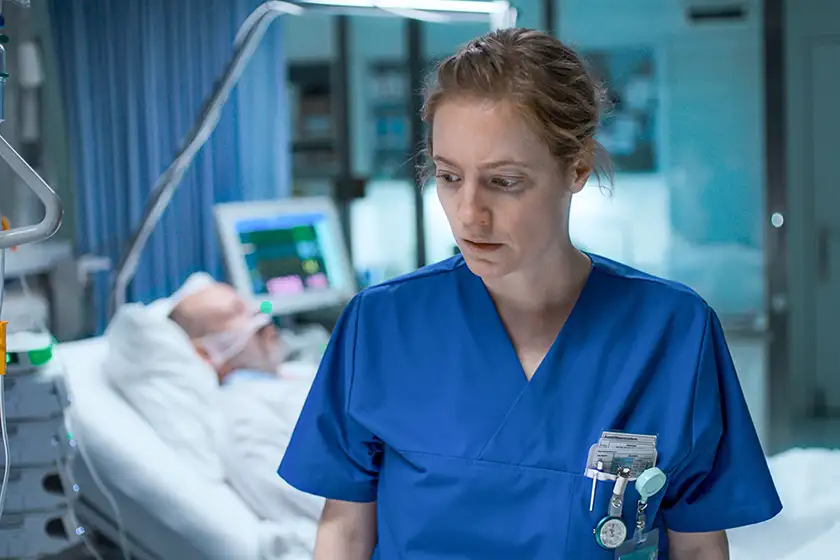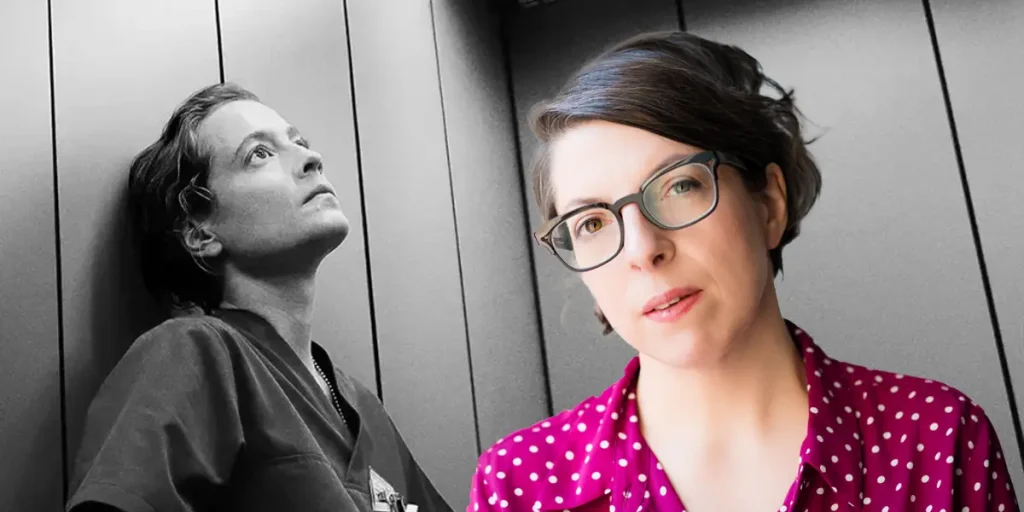In our interview with the writer-director of Late Shift Petra Volpe, we discuss representation in hospital dramas and the importance of nurses on screen.
Petra Volpe has always wanted to make a medical drama. But it wasn’t until she read Madeline Calvelage’s book titled ‘Unser Beruf ist nicht das Problem. Es sind die Umstände: Eine Geschichte, die zeigt, was es heutzutage bedeutet, Pflegekraft zu sein’, which translates to ‘Our profession isn’t the problem. It’s the circumstances: A story that shows what it means to be a nurse today.’, that she knew exactly what to base her story on. Calvelage describes a singular night shift working on a hospital ward as a nurse and the difficulties she faced working on her floor whilst understaffed. Volpe took instant inspiration and started writing Late Shift.
Leonie Benesch stars as Flora, a nurse on a late shift, similar to that described in Calvelage’s book. Flora loves her job as a nurse and is, unfortunately, used to her long, demanding stints at the hospital. The film serves as an empathetic, but informative story that showcases what is happening in the medical field in Switzerland, and across many other places globally, too.
We sat down to interview writer-director Petra Volpe where we talked about the importance of feminist representation on screen, why we need to be more understanding patients, and the reason medical dramas need to show nurses as hospital heroes.
Petra Volpe on her inspirations and the collaborative process of filmmaking
After reading Madeline Calvelage’s book, did you begin writing and collaborating on the script right away or did it take some time for you to decide it was this particular idea of a night shift that you wanted to make into a film?
Petra Volpe: Immediately. I had been wanting to make a film on this topic for a really long time. I was living with a nurse for many years but I didn’t find the form I wanted until I found the book on Calvelage’s one shift, and it read like a thriller to me. I thought, “this is the film I want to make”. From there, I started to do a lot of research. I contacted Madeline and she became a consultant on the script. I also had a nurse from Switzerland as a consultant. I talked to dozens of nurses in Switzerland, Germany and America.
How collaborative was the process with hospital staff both when writing and when actually on set?
P.V.: I went into a hospital to do more research to get a really good overview of how it all works before filming, but we didn’t shoot in a running hospital. It was an empty hospital that was going to be demolished. We had two floors. All the staff in the film are fictional and are mainly actors, but some are real nurses I cast. We had an ICU nurse as a consultant on the actual set who has been working for 25 years. She was also the coach for Leonie [Benesch] and was the one to train her to do all of the medical procedures she does onscreen. She sat with me whilst filming and was checking to see if we did everything correctly.
How did you go about picking the specific patients and their issues?
P.V.: All of the patients were inspired by research but also personal life. There’s an old gentleman in the film who is worrying about his dog and that’s something I would be thinking about too if I was sick in hospital. I wanted to tell a really precise and accurate story about nursing. I wanted to show what it really means to be on a ward when one nurse is missing. The patients are constructed in a way to serve this story. I wanted to have a broad palette of people, so we have young people, old people, women, men. Everyone who watches it can sort of recognise themselves.
Highlighting issues and the universal background of Late Shift
Did you plan on making such an emphatic film or more of one just to highlight issues? Or maybe both?
Petra Volpe: Our strong aim was to make a movie that makes you feel like you did the shift yourself. I want it to create empathy but also an experience. A lot of people feel exhausted after the movie. I think that’s a really great effect. If we can create that feeling, we’ve succeeded. If you leave with more respect and become a better patient, then we’ve already done a great job.
How important do you think it is for filmmakers to highlight issues that are ongoing in hospitals, particularly storylines with understaffed hospitals and nurses?
P.V.: You always hope to move something with a movie. My films usually have a social or political background that I focus on. Tackling issues is the way I make my movies. I don’t think a film can change the world.
I don’t think many nurses feel seen or appreciated. Everyone was clapping during COVID on their balconies. Our movie is a big thank you to the nurses. In Switzerland and Germany our film has been embraced by unions and schools, and it’s started petitions for better conditions. We hope this movie makes them feel seen to fight.

I know your background is Swiss, but was there a specific reason why you wanted Late Shift to be set in Switzerland rather than somewhere else in Europe?
P.V.: Because I am Swiss, we had the Swiss funding behind us, so it made it relatively easy to finance the film in Switzerland. We shot it quite quickly with momentum. The moment I started writing the script, I was able to finance the film. Everyone recognised how timely the subject matter was. We very purposely took a hospital that could be anywhere. It’s a very universal story.
But what’s particular about Switzerland and its nurses is that it’s not a question of money when it comes to shortages; it’s more a question of priority. In Switzerland it’s not about logistics either. The hospitals look nice and the rooms are beautiful. But if you have a beautiful hospital and no nurses you’re still going to die. I wanted to show that it’s not the hospital itself. In my research I found that the nurses just don’t have time for their patients anymore. They’re not able to do the work.
Petra Volpe on representation, feminism and what’s next for her
I’m interested in knowing if you had any input and/or feelings about the title of the film translating to different things in different languages. In German it’s Heldin meaning ‘Heroine’, in English it’s Late Shift and in French it’s En Première Linge meaning ‘on the front line’. I know it’s a common practice to change film titles in different countries but each one isn’t a direct translation and could maybe be interpreted differently.
Petra Volpe: The problem with Heroine is that you always have to explain that it’s not the drug, ‘heroin’ [laughs]. The film is about a heroine, but not about heroin. Heldin is ambiguous in German anyway, so we decided for a more sober title in English. I know that the title has been controversial in Germany, but the women who do these nursing jobs are female heroes! I wanted to keep it that way.
I read that you have an upcoming project, your first English language film. Could you give us a sneak peak of what’s to come?
P.V.: I just shot a film in the UK about a men’s prison. It’s my first film with a cast made up of almost all men. My first movie was about a prostitute and a Swiss housewife who fights for women’s rights to vote. I tackle a lot of feminist issues. Even making a movie about men can be feminist. You also need new role models of men on the big screen; it’s a different kind of perspective on masculinity. Whether I make movies about men or women they will always have a feminist perspective.
I really love the way you look at stories. I am really glad to see this representation on screen. We have Casualty in England which has a primetime Saturday night spot on TV but Late Shift really homes into this specific nursing issue.
P.V.: It’s really all about representation. All of these hospital shows always focus on doctors. The doctor is always at the center of the narrative. Even if there’s an interesting nurse somewhere she’s never the main character. There’s very few films and shows where the nurse is the main character. On an actual hospital ward, they’re the main character. The nurse is the one who is coming to your room to see if anything can change. A surgery can go well and succeed but if the aftercare isn’t there from the nurse you will die! Nurses are just in the background hanging up an IV or falling in love with the doctor. She is never the main character! We want to change this. She is the main character.
I just wanted to end by saying thank you for being a director and writer who amplifies women’s voices and stories. You’re a great voice for a lot of women.
P.V.: It’s a shame so many nurses are treated badly, as it’s a woman’s job! 80 percent of nurses are women, globally. It’s historically been this way. I know the crisis in the UK is the same [as Late Shift with understaffed hospitals] that the nurses aren’t getting taken seriously either!
This interview was edited for length and clarity.
Late Shift (Heldin) will be released in U.K. & Irish cinemas on 1st August, 2025. Read our review of Late Shift!
Header credits: Leonie Benesch in Late Shift / Writer-director Petra Volpe (Courtesy of Vertigo Releasing)

